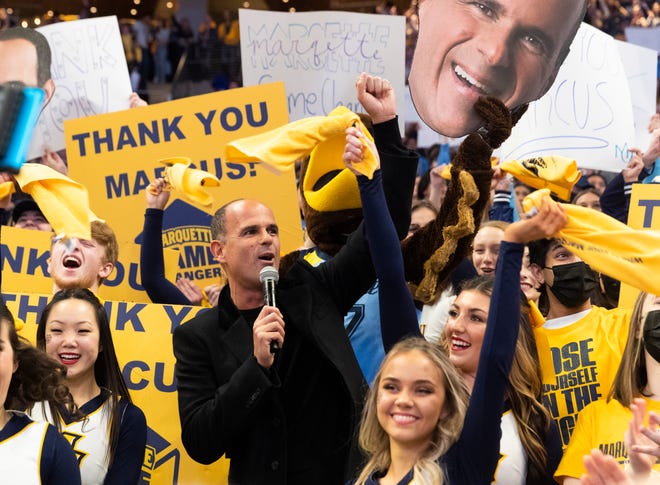
Marquette University alumnus Marcus Lemonis — star of HGTV’s “The Renovator,” CNBC’s “The Profit” and chairman and CEO of Camping World — has donated $15 million to the university to support students educational and career development.
Lemonis announced the gift during the Marquette men’s basketball game Saturday. The gift will in large part fund the renovation of the university’s Memorial Library, which will be renamed as the Lemonis Center for Student Success.
It also includes a $5 million challenge to encourage other alumni to donate to the university’s efforts around ensuring student success.

The new center will serve as a brick-and-mortar home for the university’s student success initiative, which Lovell announced last year as a key campus priority.
Sitting in the middle of Marquette’s campus, the center will serve as a hub for students to seek out help with the various challenges they may face throughout their college careers, with the goal of making access to resources like peer mentoring, tutoring, mental health services and career exploration more easily accessible.
Memorial Library has been underutilized in recent years, spokeswoman Lynn Griffith said, as technology expands and students can more easily study from anywhere on campus or in the city.

More:National challenges in higher education echo through a debate over Marquette’s future
John Su, Marquette’s vice provost for academic affairs and student success, described the center as a place where students can come if they don’t feel their major is the right fit, or if they want to further explore how they can use what they learn in the classroom to make an impact on their community.
Staff in the student success center will work to guide students to resources that at times can seem siloed and difficult to navigate because they are currently located in various buildings across Marquette’s campus.
“We recognize that often, an academic issue is a mental health issue is a career issue,” Su said. “And that’s why you need a hub that’s going to coordinate with those existing offices to amplify the great work that’s already occurring so that every student knows: ‘I have an advocate who’s going to help me in that navigation process.'”
More:Marquette publicly launches $750 million fundraising campaign, largest in the university’s history
In an interview with the Journal Sentinel on Thursday, Lemonis said that type of holistic development is what he wanted to support through his donation.
As a member of the university’s 1995 class, Lemonis became the first in his immediate family to graduate from college. He threw javelin as a student athlete. But he wasn’t “the best” at anything, he said, whether it was his sport or his studies. Still, Marquette gave him the confidence to keep trying. He described his time in college as “a relentless pursuit of achievement in the face of constant rejection.”
He said he hopes that his gift helps students who feel like they are different or are struggling to find their path to success in college.
“I think what happened was I started reflecting, as I got older, on how I had to work harder than I should have to find my success paths at Marquette,” Lemonis said. “Not from a curriculum standpoint and not from a faith standpoint, but going from a youth to an adult.”
He said he wants the center to serve students the way his businesses serve their employees, helping connect them to resources and professional development opportunities and to chart a path for their careers.
Such work is in line with Marquette’s identity as a Jesuit university, Su said, in that the college seeks to support students holistically, in terms of more than just getting an A on their next test.
Alongside developing the student success initiative, Marquette also has worked to raise millions for various scholarship programs that financially support students from low-income backgrounds, create exclusive scholarship opportunities for Milwaukee area students and help students who are at the risk of dropping out due to financial crises.
The overall work on student success has to be ongoing, Su said, as does the investment of resources in it.
The goal, he said, should be that every Marquette student leaves campus able to point to one person who advocated for them and one hands-on educational experience that kept them motivated and connected to the campus community even when the college experience got tough.
“That’s where the work continues,” Su said.
As part of the student success initiative, Lovell has set a goal for Marquette to raise its retention rate — the percentage of students who come back to school after their freshman year — from 90% to 94%.
The university also aims to raise its six-year graduation rate to 90%. Of the students who enrolled as freshmen in 2015, 81.4% graduated within six years according to the National Student Clearinghouse.
“This gift is life-changing as it will help all students succeed and thrive on campus,” Lovell said. “We are incredibly grateful to Marcus for his leadership and his passion to help Marquette become a national leader and rise in new and innovative ways.”
This type of investment in student success is part of a shift that has been seen at universities across the country, public and private, as they move from what Su calls an “opportunity mindset” — under which colleges accept students and see it as the student’s responsibility to sink or swim — to a “success mindset” — which focuses on the potential each student has and the role the college has in helping them achieve it.
“The role of college is not just to provide just that opportunity, but to help you discern what success looks like for a lifetime,” Su said.
Contact Devi Shastri at 414-224-2193 or DAShastri@jrn.com. Follow her on Twitter at @DeviShastri.
